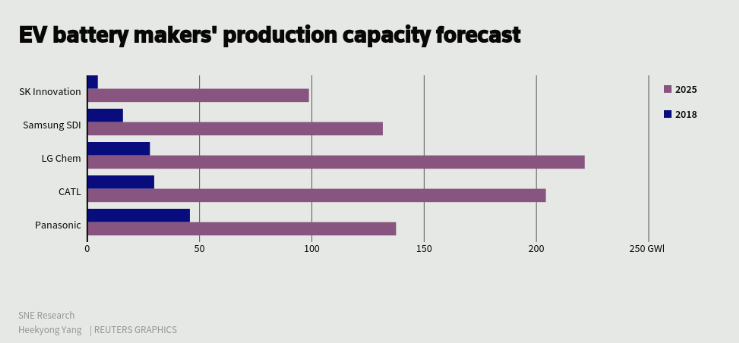Korean EV Battery Firms Are At War, Threatening The US Electric Vehicle Market
An ongoing war between EV battery manufacturers in Korea could spill over and begin to cause volatility in the U.S. electric vehicle market.
Back in 2018, South Korea based SK Innovation beat out local rival LG Chem to supply Volkswagen with a multi-billion EV battery order, according to Reuters. As a result, SKI broke ground on a new $1.7 billion plant in Commerce, Georgia, which is about 200km away from VW’s Chattanooga plant.
But LG Chem didn’t take the news sitting down: they took SKI to court in April, accusing the company of misappropriating trade secrets. Now, seven months later, it has been a barrage of U.S. lawsuits between the two companies for battery patent infringements. It has become a war that “threatens to disrupt the launches of electric vehicles (EVs) by some of the world’s biggest carmakers.”
In one court filing, LGC said its rival poached employees working on its own project to supply batteries for VW’s MEB electric vehicle architecture – and that SKI only won the VW contract because it had misappropriated trade secrets.
SKI has denied stealing trade secrets, saying its staff signed agreements not to use information from former workplaces. “We value intellectual property,” a spokesman for SKI said.
If the U.S. International Trade Commission (ITC) rules in favour of LGC on June 5, when it is due to make a preliminary ruling, that could jeopardise SKI’s plans to supply VW in the United States with batteries from Georgia or a new factory in Hungary, according to court filings.
Both companies are trying to stop each other from importing and selling EV batteries that will be used in VW’s SUVs, as well as electric vehicles from GM, Ford, Jaguar, Audi and Kia.
In the balance hangs the companies’ abilities to supply U.S. automakers with batteries as car producers look to lock in supplies with large contracts ahead of an expected surge in demand.
Cho Jae-phil, a professor at Ulsan National Institute of Science and Technology who worked previously at another Korean rival, Samsung SDI, said: “Whoever loses the fight would suffer a fatal blow, unless the two reach a settlement. This will also be a setback for automakers.”
Ford spokeswoman Jennifer Flake said: “We are aware of the issue. As a normal course of action, we have business continuity plans in place to protect our interests.”
She said Ford was encouraging the two companies to resolve their conflicts without litigation and that there was sufficient demand for multiple suppliers.
GM spokesman Patrick Morrissey said: “[GM is] aware of the dispute and at this point it [does] not expect any impact on the production of its Chevy Bolt electric vehicle.”
Volkswagen says it is worried there won’t be enough batteries for all of the EVs it plans to launch over the next 5 years, mainly because other producers don’t have skilled workers for new plants in Europe to ramp up output quickly.
Korea’s battery industry tracker SNE Research shows that the market for EV batteries is set to grow 23% a year to reach $167 billion by 2025, making it bigger than the global memory chip market.
The feud is worrying the Korean government, where officials believe it could damage the firms’ reputations and allow rivals to win market share from South Korean companies.
Beejay Kim, a battery consultant, said: “No one wants them to fight till the end.”
The patent lawsuits brought forth in the U.S. means that if one companies loses, it probably won’t be able to market products using the patents in the country. There are also lawsuits pending in South Korean courts.
But SKI and LGC have said there has been so supply disruption – yet.
Tyler Durden
Thu, 11/28/2019 – 18:30![]()
Zero Hedge’s mission is to widen the scope of financial, economic and political information available to the professional investing public, to skeptically examine and, where necessary, attack the flaccid institution that financial journalism has become, to liberate oppressed knowledge, to provide analysis uninhibited by political constraint and to facilitate information’s unending quest for freedom. Visit https://www.zerohedge.com



